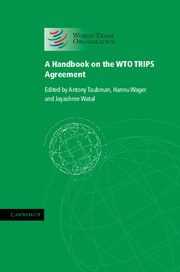Book contents
- Frontmatter
- Contents
- Figures
- Boxes
- Tables
- Preface
- Acknowledgements
- Acronyms and abbreviations
- I Introduction to the TRIPS Agreement
- II Copyright and related rights
- III Trademarks
- IV Geographical indications
- V Patents
- VI Industrial designs, layout-designs of integrated circuits, undisclosed information, anti-competitive practices
- VII Enforcement
- VIII Dispute prevention and settlement
- IX TRIPS and Public Health
- X Current TRIPS issues
- Appendix 1 Guide to TRIPS notifications
- Appendix 2 Guide to TRIPS documents
- Annexes TRIPS Handbook
- Index
VIII - Dispute prevention and settlement
Published online by Cambridge University Press: 05 May 2012
- Frontmatter
- Contents
- Figures
- Boxes
- Tables
- Preface
- Acknowledgements
- Acronyms and abbreviations
- I Introduction to the TRIPS Agreement
- II Copyright and related rights
- III Trademarks
- IV Geographical indications
- V Patents
- VI Industrial designs, layout-designs of integrated circuits, undisclosed information, anti-competitive practices
- VII Enforcement
- VIII Dispute prevention and settlement
- IX TRIPS and Public Health
- X Current TRIPS issues
- Appendix 1 Guide to TRIPS notifications
- Appendix 2 Guide to TRIPS documents
- Annexes TRIPS Handbook
- Index
Summary
Introduction
Chapters I to VII have dealt with Members' commitments as regards the substantive standards for protection of IPRs under domestic laws, as well as their enforcement through their domestic legal systems. An important feature of the TRIPS Agreement is that disputes between governments about compliance by Member governments with these TRIPS obligations are subject to the dispute settlement system of the WTO. The TRIPS provisions on dispute settlement are contained in Part V of the TRIPS Agreement entitled ‘Dispute Prevention and Settlement'.
Dispute settlement is a major feature of the WTO legal system, and this chapter outlines how it applies to disputes between Members concerning compliance with TRIPS obligations. First, however, it reviews the main TRIPS provisions and working methods relating to transparency, whose main goal is to contribute to preventing disputes from arising between governments in the first place. This chapter then reviews the main principles governing dispute settlement, including the jurisdiction of the WTO, and briefly describes the WTO dispute settlement procedures. A particular matter, still unresolved, concerns the applicability of the so-called non-violation and situation complaints to the settlement of disputes under the TRIPS Agreement. This chapter then reviews the experience to date with disputes about TRIPS compliance. A complete list of disputes in the area of TRIPS is provided at the end of this chapter, together with information about how to access the key documents.
- Type
- Chapter
- Information
- A Handbook on the WTO TRIPS Agreement , pp. 155 - 178Publisher: Cambridge University PressPrint publication year: 2012



